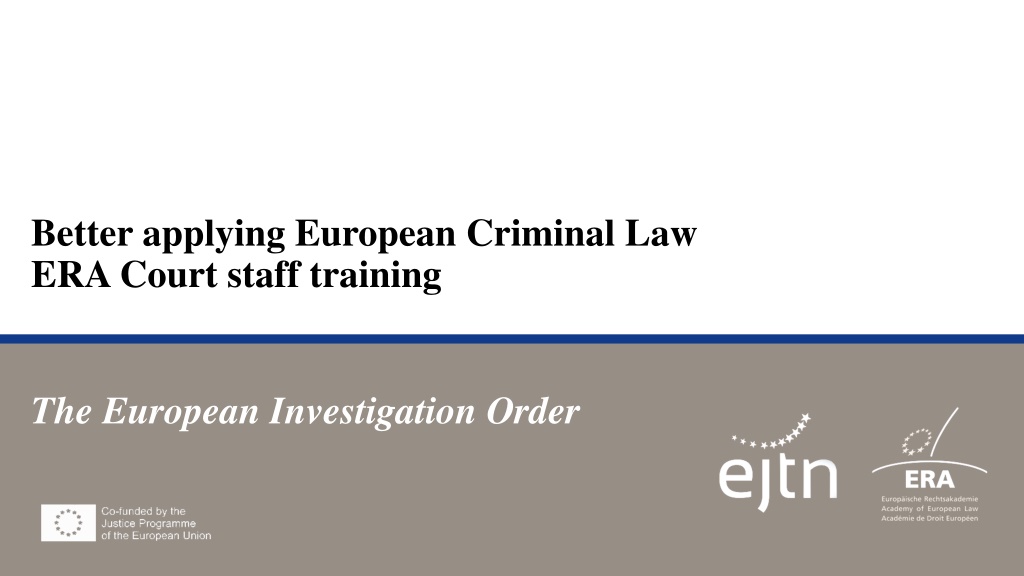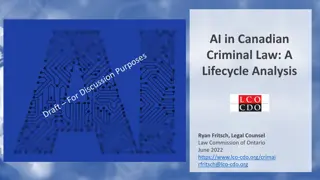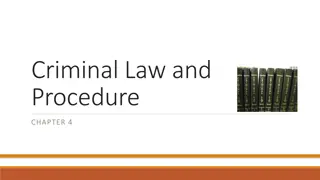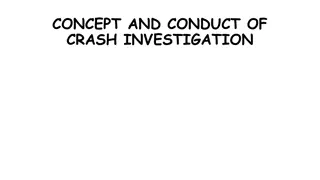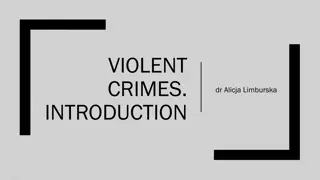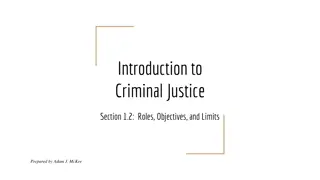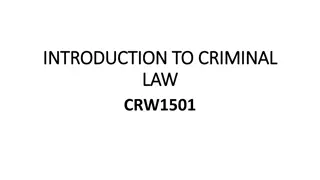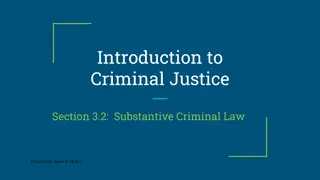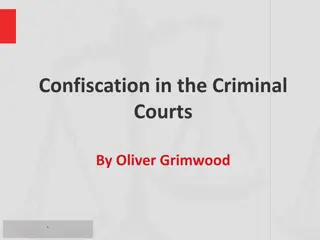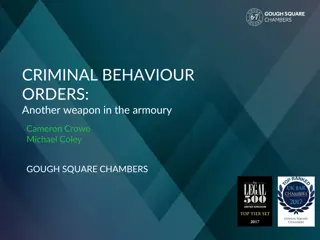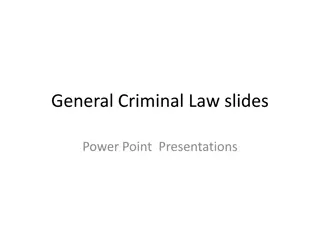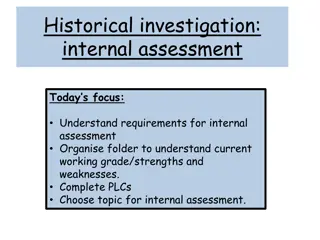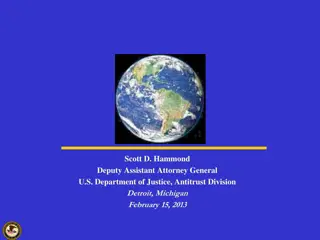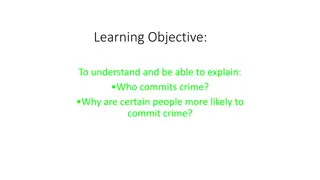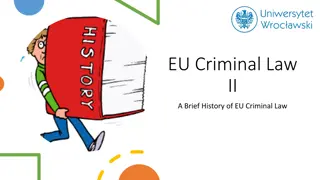Understanding European Criminal Law: European Investigation Order Training
Enhance knowledge on applying European Criminal Law through ERA Court staff training on the European Investigation Order. Explore the scope, definitions, recognition, and execution processes, along with legal remedies and obligations. Deadline details, relationship with legal instruments, and the Directive's application are highlighted.
Download Presentation

Please find below an Image/Link to download the presentation.
The content on the website is provided AS IS for your information and personal use only. It may not be sold, licensed, or shared on other websites without obtaining consent from the author. Download presentation by click this link. If you encounter any issues during the download, it is possible that the publisher has removed the file from their server.
E N D
Presentation Transcript
Better applying European Criminal Law ERA Court staff training The European Investigation Order
Content: Fact sheet Relationship with other legal instruments Scope of application Definitions Channels of transmission Recognition and execution. Alternative measures Grounds for non-recognition or non-execution. Postponement Time limits for recognition and execution Legal remedies Obligation to inform Additional resources 2
Fact sheet 22 May 2017 deadline for transposition of the Directive 2014/41/EU 26 MS have transposed it, Denmark and Ireland are not bound by the Dir. Deadlines for gathering the evidence requested are provided Limited reasons for refusing to recognise or execute an EIO A single standard form to be used Certificate MS shall execute an EIO on the basis of the principle of mutual recognition and in accordance with the Dir. 3
Relationship with other legal instruments The Directive replaces, as from 22 May 2017, the corresponding provisions of the following conventions applicable between the Member States bound by this Directive (so not in relation to Denmark and Ireland): (a) The 1959 Convention and its two protocols (b) Convention implementing the Schengen Agreement (c) The 2000 Convention and its protocol Gathering of evidence will be done according to the provisions of this Directive between the MS bound by the Directive In relation to Denmark and Ireland provisions from the MLA legal instruments will be applicable (an MLA instrument that it is in force in the MS involved in the judicial cooperation) 4
Scope of application The EIO shall cover any investigative measure to obtain evidence in accordance with this Directive (art.1 para. 1 Dir.) The EIO may also be issued for obtaining evidence that is already in the possession of the competent authorities of the executing State (art. 1 para. 2 Dir.) The Directive on EIO is not applicable to: - Setting up of a JIT and gathering of evidence within such a team (article 3 of the Dir.) - Spontaneous exchange of information (article 7 of the 2000 Convention) - Freezing property for the purpose of subsequent confiscation (Framework Decision 2003/577/JHA on the execution in the European Union of orders freezing property or evidence; and, as of 19.12.2020, Regulation 2018/1805 on the mutual recognition of freezing orders and confiscation orders) - Restitution: return of an object to victim (article 8 of the 2000 Convention) - Obtaining of extracts of the criminal records register/ECRIS - Summoning of witnesses, defendants, etc. for trials (art. 5 of the 2000 Convention or art. 7 of the 1959 Convention) 5
Definitions Issuing State - MS in which the EIO is issued Executing State MS executing the EIO, in which the investigative measure is to be carried out Issuing authority (i) a judge, a court, an investigating judge or a public prosecutor competent in the case concerned; (ii) any other competent authority as defined by the issuing State which, in the specific case, is acting in its capacity as an investigating authority in criminal proceedings with competence to order the gathering of evidence in accordance with national law Executing authority - an authority having competence to recognise an EIO and ensure its execution in accordance with this Directive and the procedures applicable in a similar domestic case 6
Channels of transmission The EIO completed and signed shall be transmitted directly from the issuing authority to the executing authority by any means capable of producing a written record use ATLAS from the EJN s website to identify an executing CA from the executing MS Each Member State may designate a central authority or, where its legal system so provides, more than one central authority, to assist the competent authorities The issuing authority may transmit an EIO via the telecommunications system of the European Judicial Network (EJN) If the identity of the executing authority is unknown, the issuing authority shall make all necessary inquiries, including via the EJN contact points, in order to obtain the information from the executing State Where the authority in the executing State which receives the EIO has no competence to recognise the EIO or to take the necessary measures for its execution, it shall, ex officio, transmit the EIO to the executing authority and so inform the issuing authority 7
Recognition and execution. Alternative measures The executing authority shall recognise an EIO without any further formality being required and ensure its execution in the same way and under the same modalities as if the investigative measure concerned had been ordered by an authority of the executing State (art. 9 para. 1 Dir.) The executing authority shall comply with the formalities and procedures expressly indicated by the issuing authority unless otherwise provided in this Directive and provided that such formalities and procedures are not contrary to the fundamental principles of law of the executing State (art. 9 para. 2 Dir.) Recourse to a different type of investigative measure (art. 10 para. 1 Dir.)- the executing authority shall have, wherever possible, recourse to an investigative measure other than that provided for in the EIO where the investigative measure indicated in the EIO does not exist under the law of the executing State or would not be available in a similar domestic case. Exceptions to the abovementioned option are provided in art. 10 para. 2 let. a) - d) Dir. The executing authority may also have recourse to an investigative measure other than that indicated in the EIO where the investigative measure selected by the executing authority would achieve the same result by less intrusive means than the investigative measure indicated in the EIO 9
Grounds for non-recognition or non-execution. Postponement Grounds for non-recognition or non-execution of an EIO limited and expressly provided (art. 11 let. a)-h) Dir.) The recognition or execution of the EIO may be postponed in the executing State where: (a) its execution might prejudice an on-going criminal investigation or prosecution, until such time as the executing State deems reasonable (b) the objects, documents, or data concerned are already being used in other proceedings, until such time as they are no longer required for that purpose As soon as the ground for postponement has ceased to exist, the executing authority shall forthwith take the necessary measures for the execution of the EIO and inform the issuing authority by any means capable of producing a written record (Art. 15 Dir.) 10
Time limits for recognition and execution The decision on the recognition or execution shall be taken and the investigative measure shall be carried out with the same celerity and priority as for a similar domestic case (art. 12 par. 1 Dir.) The executing authority shall take the decision on the recognition or execution of the EIO as soon as possible, no later than 30 days after the receipt of the EIO by the competent executing authority In urgent circumstances, if a shorter deadline is necessary or if the issuing authority has indicated in the EIO that the investigative measure must be carried out on a specific date, the executing authority shall take as full account as possible of this requirement The executing authority shall carry out the investigative measure without delay and not later than 90 days following the taking of the decision of recognition. If it is not practicable in a specific case for the competent executing authority to meet the time limit it shall, without delay, inform the competent authority of the issuing State by any means, giving the reasons for the delay and it shall consult with the issuing authority on the appropriate timing to carry out the investigative measure. 11
Legal remedies Member States shall ensure that legal remedies equivalent to those available in a similar domestic case are applicable to the investigative measures indicated in the EIO The substantive reasons for issuing the EIO may be challenged only in an action brought in the issuing State, without prejudice to the guarantees of fundamental rights in the executing State The issuing authority and the executing authority shall inform each other about the legal remedies sought against the issuing, the recognition or the execution of an EIO A legal challenge shall not suspend the execution of the investigative measure, unless it is provided in similar domestic cases 12
Obligation to inform The CA in the executing State which receives the EIO shall, without delay, and in any case within a week of the receipt of an EIO, acknowledge receipt of the EIO by completing and sending the form set out in Annex B. The executing authority shall inform the issuing authority immediately by any means: (a) the fact that the form provided for in Annex A is incomplete or manifestly incorrect (b) if it considers, without further enquiries, that it may be appropriate to carry out investigative measures not initially foreseen, or which could not be specified when the EIO was issued (c) if it establishes that, in the specific case, it cannot comply with formalities and procedures expressly indicated by the issuing authority The executing authority shall inform the issuing authority without delay by any means capable of producing a written record: (a) of any decision taken pursuant to articles 10 or 11; (b) of any decision to postpone the execution or recognition of the EIO, the reasons for the postponement and, if possible, the expected duration of the postponement. 13
Additional resources on the EJN website Competent authorities, languages accepted, urgent matters and scope of the EIO Directive (Updated 07 August 2019) https://www.ejn-crimjust.europa.eu/ejn/libdocumentproperties/EN/2120 Guidelines on how to fill in the European Investigation Order (EIO) form https://www.ejn-crimjust.europa.eu/ejn/libdocumentproperties/EN/3155 Editable .pdf form of the European Investigation Order EIO (Annex A) https://www.ejn-crimjust.europa.eu/ejn/libdocumentproperties/EN/3152 14
